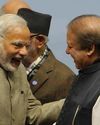The force of globalisation is an irreversible reality, and it is countries like India and China that will nurture it going forward.

THE ONGOING GLOBALISATION of autarchy—a phenomenon that has afflicted nations in various forms since the global economic crisis hit the haves of our planet on 15 September 2008 but has got a rhetorical momentum with the flourishes of US President Donald Trump over the past two months—is not new. But for every economy that threatens to or does close its economic borders through tools in the hands of its sovereigns, there are counterbalancing forces that can realign themselves to benefit from those closures.
Let’s not get carried away by the rhetoric, though. Step back and see that the resurgence of nationalism and self-sufficiency through the erection of cultural and economic barriers and walls seducing one strong nation after another is only a political construct. Economists have captured this in one word—autarchy, which the Routledge Dictionary of Economics defines as “a completely closed economy which does not engage in international trade”. The swing, if that, will be high on oratory and short on actions. Today, the new global political narrative seems to say, “from autarchy began the march of globalisation, in autarchy it will end.” I argue that this return to autarchy is really a realignment of world affairs—globalisation is not, and cannot, end.Of course, nobody, not even Trump, is actually shutting down borders. These are merely the first indications of muscle-flexing, message mongering to those who elected him. It is equally a signal to other large powers like China as an emerging superpower, West Asia as a region and emerging powers like India, that the role of US in international foreign policy will be limited and the new regime comes with an economic tit-for-tat.
The impermanence of this inward and aggressive rhetoric too is out there—the return of Trump to One China policy that insists on derecognising Taiwan as a nation, for instance.
This story is from the April 2017 edition of Swarajya Mag.
Start your 7-day Magzter GOLD free trial to access thousands of curated premium stories, and 9,000+ magazines and newspapers.
Already a subscriber ? Sign In
This story is from the April 2017 edition of Swarajya Mag.
Start your 7-day Magzter GOLD free trial to access thousands of curated premium stories, and 9,000+ magazines and newspapers.
Already a subscriber? Sign In

Refuging Progess
There is a well-orchestrated global conspiracy to deny scientific and technological developments from the West to Third World countries.

The Monk Of Science
Vivekananda believed that Religion should be subjected to scientific methods of investigation. The third and concluding part of our series on the Swami and his views on science.
The Next Step
Indian technical manpower can be trained for high-value-added emerging services in the era of mass commoditisation of hardware.
The Threat Of Autarchy
The force of globalisation is an irreversible reality, and it is countries like India and China that will nurture it going forward.

Neanderthals: The Womb Of Caves
Recent discoveries indicate that Neanderthals may have had a rich inner life, including symbolic thought. Indeed, they may have been the progenitors of human religions.

Getting India's World Right
Incremental concessions will get India nowhere with Pakistan and China. What we need is a classically conservative foreign policy, based on realism.

The Hesitant Orbit
In order to march boldly ahead into the deep space, New Delhi must work towards building a station, boost its techno-economic planning and use the Indian Space Research Organisation smartly.

Nudges And Narratives
The debate surrounding Sanjay Leela Bhansali’s Padmavati brings India a complex network of portraits within a cultural world-system.

The Spell Of Specialisation
THE INDIAN ADMINISTRATIVE SERVICE NEEDS AN URGENT REJIG. THE KEY TO SPEED AND EFFICIENCY LIES IN PUTTING AN END TO A GENERALIST APPROACH AND IN GOING FOR A NEW SERVICE.
The Great Gamble
With demonetisation, the prime minister has taken a huge risk— both economic and political. He must succeed, because this move could transform both our economy and our society.